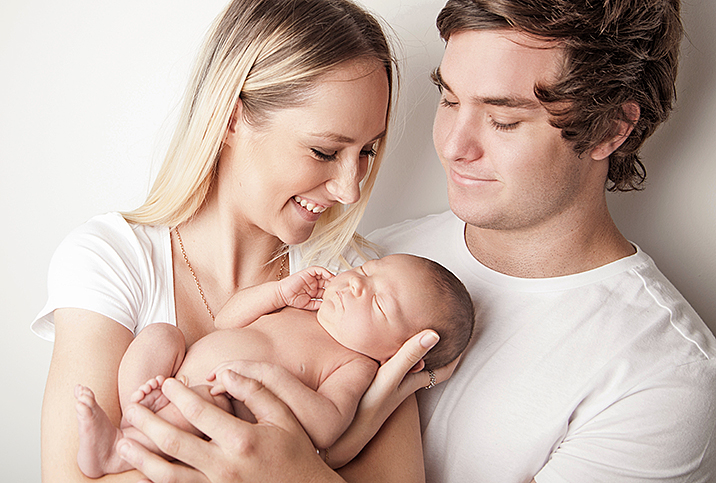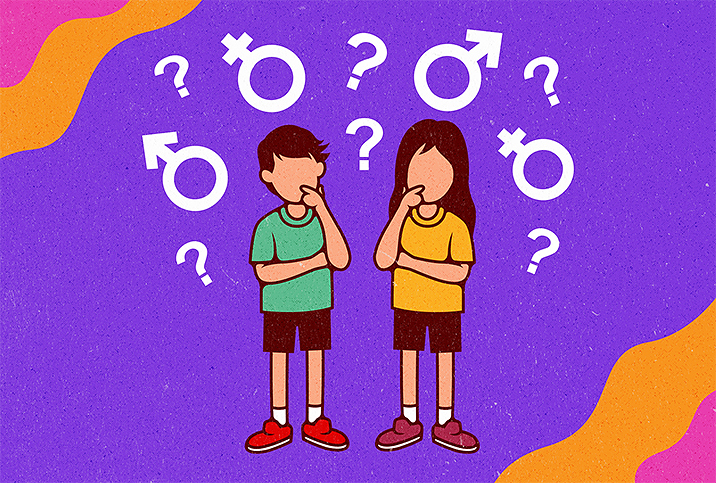Are Teenage Parents as Bad as We Make Them Out to Be?

In the sexual education curriculum of my school, teen pregnancy was marked Public Enemy Number One: the worst possible threat we could face in the murky waters of adolescent sex. Sexually transmitted diseases and psychological consequences were background players when it came to the sexual scare tactics of my upbringing. The real big bad was the omnipresent threat of having a baby before we were ready.
Sex was certainly on my mind then, but that's about the only place I could find it. My social life lacked opportunity for investigation, as we didn't pay for cable and I didn't even have regular access to the internet growing up, thus sex and its consequences felt more theoretical than practical. Plus, being the byproduct of a teen pregnancy myself, and knowing full well the challenges it had created for my parents, that ol' boogeyman from sex ed held a prominent place in my nightmares.
Were my imbued fears of teen pregnancy well-founded? Probably not, but complications do exist when it comes to pre-adult pregnancy.
On biology
"You know, if a teenager has good prenatal care and [pays] attention to a pregnancy, I don't think there's any huge difference between a 15-year-old and an 18-year-old, if that makes sense," said Nora Oates, M.D., a pediatrician with more than 20 years of experience in the New Orleans area. "Things don't change much for teenagers, whether they are getting their driver's license or casting their first vote, but...teenagers as a group can be subject to more complications when it comes to pregnancy and childbirth.
"If they choose to go through pregnancy, teenagers, in general, are at some increased risk for medical complications during those pregnancies, and no one's quite sure why they inherently have those issues. But it is true," she added.
Some examples Oates cited include increased blood pressure and signs of anemia. She also explained that among the biggest challenges with teenage pregnancy is an increased risk for underdeveloped infants and/or premature delivery. This is true for all teenagers, but a 15-year-old is probably even less likely to seek prenatal care in a timely manner than someone even just a few years older.
Teens can sometimes be more prone to substance use or abuse, too. This comes with its own unique set of challenges to pregnancy and fetal development, so knowing the health history and lifestyle practices of the patient remains important.
"It's a very cloudy picture," Oates said. "I think it's hard to single out true medical challenges that come with a teen pregnancy versus all of the psychosocial pieces that cloud it."
The psychosocial aspect
Lawrence Siegel, M.A., CSE, is based out of Boynton Beach, Florida, and works with individuals and couples in therapy and educational settings using his background as a clinical sexologist.
"The cautionary tale is that we don't want to overly pathologize teen pregnancy or teen parenting," he said.
Teen pregnancy can be challenging, for reasons entirely outside of the young parents' control. To be young and with a child in America often means obstacles to necessities like education, economic opportunity and potentially vital medical services. There can even be impediments to social arrangements and relationships.
Siegel noted teen parents are less likely to be in a stable relationship before, during and/or after the pregnancy. This means teen parents may be lacking a type of social support, which pregnant people may otherwise find in their platonic or romantic partnerships and acquaintances.
'The cautionary tale is that we don't want to overly pathologize teen pregnancy or teen parenting.'
"It depends on what other factors are in place," he said. "I think, in general, teen parents—even under the best of circumstances—may still be experiencing relationship issues. Let's face it, how many 40-year-olds are truly mature enough to have an intelligent, mature, effective relationship?"
In other words, within the context of linear cognitive development and learned communicative resources, teenagers are generally lacking some of the language and interpersonal tools that make relationship sustainability possible.
Some teenagers may thrive and prosper in a pregnancy situation, learning on the fly and adapting to new scenarios with ease, but it's impossible to expect a still-developing mind to adjust easily to the ins and outs of adult life while simultaneously coping with the nuances of forming adult relationships—while also adopting the many responsibilities of parenthood.
Circle(s) of support
"How much care and support is that teen parent—and, by extension, the child of that teen parent—getting from other areas, especially the family?" Siegel asked rhetorically.
Similar to the biological challenges of teen pregnancy, Siegel noted the accompanying psychological hurdles can be overcome with the right elements of support and care in place.
Siegel cautioned young mothers against allowing parenthood to consume their identity. He mentioned a slight concern that the rise of teen-pregnancy shows—and other media that allows for a glamorization of pregnancy—could give way to a trend in which teenagers may experience a loss of personal agency by focusing their concept of "self" entirely into motherhood. He stressed that teen mothers need space to identify with other aspects of their identity outside of parenthood.
These identification traps tend to be more perilous for teenagers who lack opportunity educationally, professionally or socially. Siegel explained that a child—or the idea of a child—can make for a tantalizing proposition when a young woman lacks other adult priorities to engage with.
"If I don't really have any meaning or sense of purpose in my own life, what a wonderful thing to aspire to," Siegel said, referring to the idea of bearing a child in the eyes of some young moms. "This idea can be part of a concerning framework which can ultimately lead to perspectives, which are sometimes selfless in an unhealthy capacity.... A lot of young teen moms have really learned that their body is nothing more than a vessel for other people to use."
While such an outcome is possible for teen parents, it's far from certain. It's important to remember that, with adequate support and care, things can turn out okay for both teen parents and their children.
An unequaled opportunity
Siegel said childbearing teenagers may discover an often-ignored silver lining.
"In a lot of ways it could be an opportunity that most people never get in learning how to form their own relationships," he said. "That's a concerted, intentional view that this is creating a partnership. Most people don't ever have anything like that in any of their relationships."
It's true that a teenage pregnancy is going to be riddled with challenges, and every relationship connected to the pregnancy is likely to experience changes throughout. But, those things could be said of any pregnancy.
It's important to remember that, with adequate support and care, things can turn out okay for both teen parents and their children.
Teenagers are going to encounter challenges to their development, but when we allow stigmatization of a person's challenges to affect how much support the person receives, then that person's troubles become significantly compounded.
It may be an uphill battle for teenagers overall, but Siegel noted the opportunity to bond over a pregnancy is one we shouldn't overlook.
"We can still approach it with hope and optimism that there is a chance that they can have a really healthy, long-lasting and effective relationship," he said. "And, they can build something really great together."
If I do say so myself, great things can come from a teenage pregnancy.


















